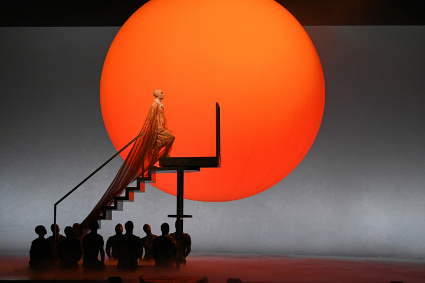| Opera Reviews | 16 April 2024 |
Akhnaten finds favor at the Metby Steve Cohen |
|
Glass: Akhnaten |
|

Anthony Roth Costanzo (Akhnaten)
|
|
|
Akhnaten is Philip Glass’s best opera, and I’m glad it’s having a success this season at the Metropolitan. Still, those of us who love this opera shouldn’t get so carried away that our enthusiasm turns off a wider public. Let’s face the facts. The idolatrous praise that some of us heap on Akhnaten tends to alienate others. Numerous subscribers at a recent HD screening walked away muttering. Many of them made fun of Glass’s style and commented that fans must have drunk some mind-altering Kool-Aid. At the beginning of Akhnaten, ten minutes of repetitions of a simple four-note motif take place before any musical development starts. For me, this is mesmerizing. But non-believers think that those who adore Philip Glass are delusional. My father used to complain about my taste. He said that In the Mood was boring, “the same thing over and over again.” He couldn’t hear the differences. And so reactions go, from one generation to the next. Skeptics do have a point, however. Switching a few notes after prolonged sameness does not, in itself, confer profundity. For those who are not yet enthralled, let’s continue with my comparison and then notice how Glass’s orchestral and choral voicings are much more varied and expressive. Acts II and III contain a considerable amount of invention and variety. That ten-minute opening of Act I is simply an elongation of Wagner’s technique at the start of his Ring. Akhnaten is Glass’s most dramatic opera. The story is clear-cut; uncluttered by meandering digressions. The libretto shows how Akhnaten changed Egypt into a monotheistic state. He built a new capital city and became a cult figure. He proclaimed that he was the only intermediary between the sun god and the people as he concentrated power in his own hands. Sigmund Freud in his book Moses and Monotheism argued that Moses was an adherent of Akhnaten who fled Egypt and founded Judaism. But there also was a negative side. The Egyptologist Nicholas Reeves wrote “Displays of frightening self-censorship and toadying loyalty are ominous indicators of the paranoia which was beginning to grip the country. Not only were the streets filled with the pharaoh's soldiers; it seems the population now had to contend with the danger of malicious informers.” This conjures the mood of the French Revolution and Giordano’s Andrea Chenier. After Akhnaten’s death, subsequent rulers reversed his policies and obliterated his name. Art created during his reign was defaced or destroyed, and Akhnaten’s monuments were dismantled. Only towards the end of the nineteenth century did excavations restore interest in his life. As in Glass’s other operas, Einstein on the Beach and Satyagraha, Akhnaten is about a person driven by an inner vision which altered the age in which he lived. Somewhat like King Akhnaten himself, this opera has become an object of intense adoration. Infatuated writers call it “transcendent” and “exalted.” I’m content to describe it as spellbinding. Richard Schickel in Time magazine famously criticized Glass's music as “tuneless, oppressive, droning, painfully self-important." I advise listeners to take a wide view. Look at the arc of Akhnaten’s three acts, and you’ll be pleasantly surprised by the wealth of variety within it. Phelim McDermott’s direction emphasizes gender fluidity which appears in art from Akhnaten’s era and which is currently in vogue. Anthony Roth Costanzo is masterful as he embodies this role. (Tomb texts describe him as "mother and father of all that is.”) Visually and vocally Costanzo portrays Akhnaten’s androgyny artistically and tastefully, including his slow entrance while naked. Superbly supporting Costanzo were J'Nai Bridges as Nefertiti, Dísella Lárusdóttir as Queen Tye, the mother of Akhnaten, and Zachary James as his father. Karen Kamensek conducted with nice attention to the ebb and flow of Glass’s score. Thanks to the radio broadcasts on Sirius, I heard three performances and noted how the power of the orchestra and chorus expanded as the musicians became more familiar with the work. Here, as in Satyagraha, Glass uses obscure ancient language and insists that no translation be provided. This tends, regretfully, to suggest that the opera is meant for a chosen few. The display of translation would add to our enjoyment, and to our knowledge of history.
|
|
| Text © Steve Cohen Photo © Karen Almond / Met Opera |
|







